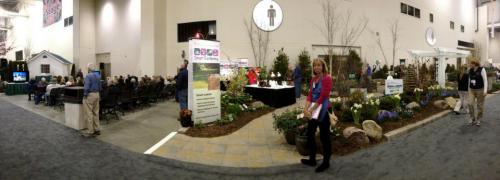By Rebecca Krans, Michigan State University Extension
Use Smart Gardening techniques to build healthy soil and increase the life within it. Learn more about healthy soils and composting at the 2015 West Michigan Home and Garden Show, March 5-8.
Our gardens rely on the soil to provide a medium for plant growth. Soils have different properties that determine how rich in nutrients or poorly drained they are. When selecting and preparing a garden site, be sure to determine the current soil’s properties. Don’t guess, soil test to see the levels of nutrients present and learn which amendments are recommended to improve the soil. Gardeners can work to increase the amount of organic matter within the soil by using organic mulch, adding compost and using minimum tillage practices. All of these smart practices help promote “the life” within the soil – the microorganisms and fauna that are a necessary part of healthy soil.
Compost pile.
The foundation of a healthy soil relies on a soil management plan. Smart fertilizer use begins with creating a long-term plan for your garden that will build a sustainable soil system. The life within the soil requires food, water, shelter and the proper environment to survive and reproduce. Smart gardeners can help to supply these requirements by providing additional organic matter to the soil.
Organic matter can be increased through various methods. One way is to simply apply a layer of organic mulch around your plants. The organic mulch creates a layer that protects the soil’s surface, therefore regulating soil temperature and moisture and helping with weed control. It also provides a shelter for insects and worms to live in. Organic mulch is a food source for microorganisms like bacteria and fungi that will, over time, break down the components of the mulch and convert them into usable nutrient forms needed by plants.
Apply at least a 3-inch layer of organic mulch around your vegetable plants. Continue replenishing the mulch throughout the growing season. Examples of organic mulch include shredded leaves, grass clippings and bark chips. Be sure to never use black walnut leaves or tree parts as they contain the substance juglone that prohibits the growth of many vegetables.
Gardeners can also create a source of organic matter through the process of composting. Creating compost and adding it to your garden soil is a smart practice. View the “Science of Composting” video to see exactly how to construct and manage a three-bin system. Make use of vegetable scraps within your kitchen, yard and garden residue to build a compost pile. Depending upon what type of composting, the organic matter produced via composting can be added back to the garden in three to six weeks.
Michigan State University Extension horticulture educators will be sharing Smart Gardening advice at the West Michigan Home and Garden Show, March 5-8, 2015, at the DeVos Place in Grand Rapids, Michigan, 303 Monroe Ave NW, Grand Rapids, MI 49503. On Friday, March 6, from 4-4:30 p.m. a free seminar on building smart soils with composting will be given on the Garden Stage. Five new tip sheets on vegetable gardening will also be available at the MSU Extension Smart Gardening display.
- Choosing a smart site for your vegetable garden
- Preparing the smart vegetable garden
- Smart watering in the vegetable garden
- Smart fertilizer use: A vegetable garden begins with a soil management plan
- IPM: Smart pest management for the vegetable garden

MSU Extension Smart Gardening display with the Garden Stage to the left at the 2013 West Michigan Home and Garden Show.
Attend any of the following gardening seminars presented by MSU Extension faculty and staff for free.
Thursday, March 5 seminars
5:30-6 p.m. – Smart Container Gardening (Rebecca Finneran, MSU Extension)
7-7:30 p.m. – Smart Vegetable Gardening (Rebecca Finneran, MSU Extension)
Friday, March 6 seminars
1:30-2 p.m. – Pest Smart: Know the New and Unusual Pests in the Garden and Landscape (Bob Bricault,MSU Extension)
4-4:30 p.m. – Building Smart Soils with Composting (Rebecca Krans, MSU Extension)
7-8 p.m. – The Living Landscape, Designs for Beauty and Biodiversity in the Home Garden (Rich Darke, horticulturalist, landscape design consultant, author, photographer)
Saturday, March 7 seminars
2:30-3 p.m. – Smart Soils: Using the MSU Soil Test Self-Mailer to Fine-tune Your Soils (Hal Hudson, MSUExtension)
4:30-5 p.m. – Smart Water Management Using Drip Irrigation in the Garden and Landscape (Hal Hudson,MSU Extension)
5:30-6:30 p.m. – The Living Landscape, Designs for Beauty and Biodiversity in the Home Garden (Rich Darke, horticulturalist, landscape design consultant, author, photographer)
Sunday, March 8 seminars
1:30-2 p.m. – Smart Lawns with Minimal Pesticide Use (Hal Hudson, MSU Extension)
For more information on a wide variety of smart gardening topics, visit the Gardening in Michigan website at www.migarden.msu.edu or contact MSU’s toll-free garden hotline at 1-888-678-3464. You can also visit us at the Novi Cottage and Lakefront Living Show Feb. 26-March 1 in Novi, Michigan; the West Michigan Home and Garden Show March 5-8 in Grand Rapids, Michigan; the Lansing Home and Garden Show March 19-22 in Lansing, Michigan; and the Garden Extravaganza Gardening Conference April 11 in Marquette, Michigan.